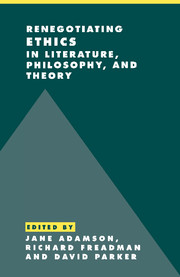Book contents
- Frontmatter
- Contents
- Introduction: the turn to ethics in the 1990s
- I ETHICS, LITERATURE, AND PHILOSOPHY
- II ETHICS AND AGENCY
- 5 What differences can contemporary poetry make in our moral thinking?
- 6 Moral luck in Paris: A Moveable Feast and the ethics of autobiography
- 7 The unseemly profession
- 8 The patient writes back
- III POLITICS AND ETHICS
- Index
7 - The unseemly profession
Privacy, inviolate personality, and the ethics of life writing
Published online by Cambridge University Press: 04 February 2010
- Frontmatter
- Contents
- Introduction: the turn to ethics in the 1990s
- I ETHICS, LITERATURE, AND PHILOSOPHY
- II ETHICS AND AGENCY
- 5 What differences can contemporary poetry make in our moral thinking?
- 6 Moral luck in Paris: A Moveable Feast and the ethics of autobiography
- 7 The unseemly profession
- 8 The patient writes back
- III POLITICS AND ETHICS
- Index
Summary
Everyone thinks he is more or less the owner of his name, of his person, of his own story (and even of his image).
(Philippe Lejeune)The right of property in its widest sense, including all possession, including all rights and privileges, and hence embracing the right to an inviolate personality, affords alone that broad basis upon which the protection which the individual demands can be rested.
(Samuel D. Warren and Louis D. Brandeis)Children are always episodes in someone else's narrative.
(Carolyn Kay Steedman)Is there harm in life writing? Aside from writing something libellous, what would the harm be? I found such questions disturbing, for I had conditioned myself for many years to think rather of the good of life writing, of its natural place in a lifelong process of identity formation. Moral issues, of course, the rightness of a subject's acts or motives, frequently constitute a primary content of biographical and autobiographical narrative. But I was drawn instead to focus this inquiry on the moral consequences of the act of writing itself. What is right and fair for me to write about someone else? What is right and fair for someone else to write about me? I discovered the beginnings of an answer to these questions in the legal and philosophical discussion of the individual's right to privacy.
I want to note at the outset that a distinctly individualist bias colours this discussion. Philosophers and jurists characteristically posit the capacity for action in an autonomous, free-standing model of selfhood – a distinct and clearly defined person who acts and is acted upon.
- Type
- Chapter
- Information
- Renegotiating Ethics in Literature, Philosophy, and Theory , pp. 161 - 180Publisher: Cambridge University PressPrint publication year: 1998
- 5
- Cited by



